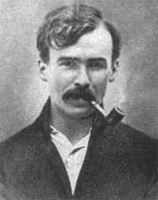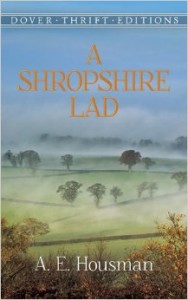We know what the most famous poem to come out of World War I was, “In Flanders Fields” by John McCrae. But what poems did the soldiers themselves read?
The answer is both surprising and not surprising. If you know British military history, the answer is not surprising. But the answer is surprising for the sheer volume of poetry that was created in and about the war. At one point, the Times of London was receiving 100 poems a day for possible publication. It seemed that everyone was writing poetry – officers and soldiers in the field, families back home, government officials, retired military people, doctors and nurses, and even well established authors like Thomas Hardy and Rudyard Kipling.
Today we associate the poetry of World War I with a relatively small number of poets, some 10 to 15, who fought and wrote poems. Many of them, like Wilfred Owen, Rupert Brooke, Edward Thomas and Isaac Rosenberg, died in the conflict. Others, like Robert Graves and Siegfried Sassoon, survived and eventually died of old age.
 And while many of these poets were publishing while they were still alive, and being read in the trenches, there was one volume of poetry that was the most popular. It was A Shropshire Lad by A.E. Housman.
And while many of these poets were publishing while they were still alive, and being read in the trenches, there was one volume of poetry that was the most popular. It was A Shropshire Lad by A.E. Housman.
Housman (1859-1936) was not originally a poet; he was a Latin scholar. Born in Worcestershire, the oldest of seven children, he showed academic promise in school and actually won several school poetry prizes. But the biggest prize was an open scholarship for St. John’s College, Oxford, where he studied classics. He did not get a degree, however, and went to work in the U.K. Patent Office. But he continued to pursue Classics studies, focusing on Latin poetry, and his reputation grew to the point where he was offered a position at University College, London. In 1911, he accepted a Latin professorship at Trinity College, Cambridge. He is still considered to be one of the finest Classics scholars ever.
But that’s not his popular reputation. In 1896, he published A Shropshire Lad, containing 63 poems, including this poem that continues to be read and studied in school and college literature classes:
To An Athlete Dying Young
The time you won your town the race
We chaired you through the market-place;
Man and boy stood cheering by,
And home we brought you shoulder-high.
Today, the road all runners come,
Shoulder-high we bring you home,
And set you at your threshold down,
Townsman of a stiller town.
Smart lad, to slip betimes away
From fields where glory does not stay,
And early though the laurel grows
It withers quicker than the rose.
Eyes the shady night has shut
Cannot see the record cut,
And silence sounds no worse than cheers
After earth has stopped the ears.
Now you will not swell the rout
Of lads that wore their honours out,
Runners whom renown outran
And the name died before the man.
So set, before its echoes fade,
The fleet foot on the sill of shade,
And hold to the low lintel up
The still-defended challenge-cup.
And round that early-laurelled head
Will flock to gaze the strengthless dead,
And find unwithered on its curls
The garland briefer than a girl’s.

The poems slowly grew in popularity, until the Boer War (1899-1902), when the collection became popular with the soldiers in the field. Many of the Boer War veterans fought in World War I as well, and thus A Shropshire Lad was carried forward to a new conflict, the one that would for all time be associated with poetry more than any other war.
This is not poetry that would necessarily remind a soldier of home, although it is that. What it is more is poetry to read when you are facing death on the battlefield. The poems are not patriotic paeans to the glory of war; they are paeans to sacrifice. The Latin scholar who never went to war wrote poetry that touched the hearts of thousands of soldiers, because he understood the sacrifice they had been called upon to make.
Housman continued to write poetry during and after World War I. Some of these were included in Last Poems, published in 1922. After his death, his brother collected a number of his unpublished poems and published them as More Poems (1936) and Collected Poems (1939). But it was A Shropshire Lad than spoke to the soldiers and ensured his fame.
Housman died in 1936 in Cambridge. His ashes were buried in Shropshire.
Photo by Gordon Robinson, Creative Commons via Flickr. Post by Glynn Young, author of the novels Dancing Priest and A Light Shining, and Poetry at Work.
Want to brighten your morning coffee?
Subscribe to Every Day Poems and find some beauty in your inbox.
- Poets and Poems: Sandra Marchetti and “Diorama” - April 24, 2025
- Poets and Poems: Christina Cook and “Roaming the Labyrinth” - April 22, 2025
- Longfellow’s “Paul Revere’s Ride”: Creating a National Legend - April 17, 2025

Gary says
“In Flanders Fields” never would have made me think of anachronistic round bales. When did round balers come about? The 1970s?
Glynn says
Gary, thanks for reading and the comment. The photo actually isn’t an illustration for “In Flanders Fields” (last week’s post and referenced in the first paragraph here. It’s meant to evoke Shropshire. I’m not sure when the rolled bales were first used. And I’m not sure what form would have been used in Shropshire in the 1890s and 1910s. In Flanders, they would have likely still been using the rounded haystacks (like the ones Monet painted).
Maureen Doallas says
I had to look up Gary’s question. According to Wiki, Ummo Luebbens conceived the round baler around 1910; however, it was not until 1947 that the first one was made.
Maureen Doallas says
I posted a piece on FB this morning about Folio Society’s intention to mark in 2015 the centenary of Rupert Brooke’s death with a volume of his poetry and original prints. That will be a collector’s item.
SimplyDarlene says
lads that wore their honours out —
and the mist
the mist
carried
them
to sea
Martha Orlando says
Another one for my wish list, Glynn. It’s getting longer by the moment!
I remember reading A. E. Housman in college at some point. Would love to revisit him!
Blessings!
Sylva Portoian, M.D says
British People Remember
To Add Another Leaf To Your Red Poppy
For The Genocided Armenians
Before the World War I . . . Our Genocide began.
You lost young soldiers, martyred with their guns,
Who went passionately, defending their Crown;
They did not return, . . . were lamented by their nation
By parents, wives, offspring, and their countrymen.
You lost your bravest men . . . and
We felt your sadness.
We lost almost all our Artful, Literate Voiceless, Devoted, Enslaved populace
Slaughtered . . . raped . . . dehydrated . . . famineated
On the sunny Der-Zor sand!
When you remember your Armistice Day*,
Please remember, for your soldiers’ sake,
Our slaughtered unborn sons
Who never grew to become young men!
They fell to defend their dignity . . . their faith and yours Along with democracy . . . human rights . . .
Awake . . . return to your faith . . .
Remember the Armenian Genocide.
Add another leaf to your red poppy,
And make Remembrance Day
More humanitarian.
We have not yet regained our rights,
To our historic homeland . . .
Our Biblical Mount Ararat
Of civilized hearts,
Where the martyred proud reign.
Sylva Portoian, MD
Published in my poetry collection,
“My Son -My Sun”, Chants Ann… 2011
______________________
*November 11, 1918